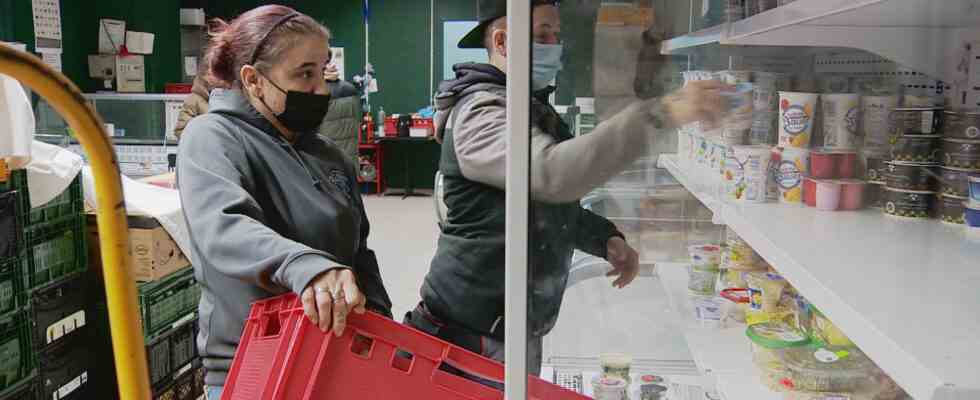Status: 11/23/2022 12:27 p.m
For weeks, the traffic light parties and the Union have been struggling over the planned citizens’ allowance. The head of the job center in Wuppertal believes that this political dispute often only had a limited connection with reality.
A white, boxy building with winding corridors in the Wuppertal district of Barmen: it is the headquarters of the Wuppertaler Tafel, one of the largest food banks in Germany. Every day, it supplies several hundred people with hot food and fresh groceries. Jäcki, in his late 30s, wearing a dark hooded sweatshirt, works here five days a week, putting yoghurt pots in the fridge and handing out goods.
Jäcki used to work as a warehouse clerk, and has been on Hartz IV since she fell ill. She ended up at the Tafel through a measure taken by the job center. The job and the contact with people are good for her, she says. “The ceiling falls on my head at home, I have to do something, I can’t sit on the couch.”
Her goal is to be able to work on the regular labor market again at some point. Working at the Tafel should help with this. It is a so-called one-euro job, mediated by the job center in Wuppertal.
Long way back to the world of work
Getting up on time in the morning, practicing resilience and social interaction – many people who have been unemployed for a long time need support to find their way back into the world of work, says Thomas Lenz, who heads the Wuppertal job center. Lenz has been working with people without a permanent job for 30 years. He knows that unemployment often goes hand in hand with psycho-social problems. No case is like the other.
Has followed the political dispute about citizen income with a shake of the head: job center manager Thomas Lenz.
Image: WDR
80 percent of the people who are cared for by the job center have not completed school or completed vocational training, around 60 percent have some massive mental or other health restrictions, reports Lenz. “We have clients here with drug problems, with high debts, with war trauma. Before we can go about finding work or training, we first try to solve these problems – on a very individual basis.”
Job center as a social authority
Today, the job centers are primarily social authorities, says Lenz. The planned citizens’ allowance should take this into account. It is good that in the future the focus should be more on training and further education, qualification and integration into society. It is also true that priority should now be given to quick placement in the job, according to the head of the job center.
On the other hand, he followed the political dispute about citizen money with a shake of the head. The discussion about an allowance of 60,000 euros per benefit recipient has little to do with reality. “These very high allowances don’t play a major role in our everyday lives. We rarely have people sitting here who have that much money.”
Traffic light coalition and Union agree on compromise proposal for citizen money
Sarah Frühauf, ARD Berlin, daily news at 8:00 p.m., November 22nd, 2022
Sanctions needed as leverage
Lenz also followed the debate about a so-called trust period of six months during which no sanctions should be imposed. In the city of Wuppertal, which has a population of 355,000, 50,000 people receive benefits from the job center, i.e. about one in seven, he reports. Among them are 15,000 Syrian and Ukrainian refugees alone. Only one percent of benefit recipients are sanctioned.
And yet you need sanctions as a means of pressure, Lenz is convinced. “In the last few weeks and months we have already noticed that we are having increasing difficulties in reaching some people due to the discussion about citizen income and a possible sanction-free period.” This particularly affects young people, some of whom had already isolated themselves during the corona pandemic. “It’s partly devastating.”
“I don’t get up for the money”
Creating a law that does justice to everyone who receives benefits from the state is not an easy task, they find in Wuppertal. Tafel employee Jäcki, who receives Hartz IV herself, thinks that sanctions are necessary to put pressure on the few people who don’t follow the rules. Her colleague Jasmin, also a one-euro jobber, agrees: “I have friends who tell me: ‘I don’t get up for the money.'”
The 29-year-old didn’t do any training after school – “probably out of laziness,” she says. Today her perspective has changed, also through the support from the job center. She likes her work at the Tafel, she doesn’t want to leave here anymore. And Jacki, who dropped out of the first job market due to a leg injury, emphasizes how important it is to have a job, a daily structure. “You don’t want to be nothing,” she says.

